International Hospitality Management Report: IHG Strategies (TLH314)
VerifiedAdded on 2022/11/25
|12
|3875
|390
Report
AI Summary
This report delves into the international hospitality management practices of InterContinental Hotels Group (IHG). It begins with an overview of the hospitality industry and IHG's background, followed by a detailed SWOT analysis to identify strengths, weaknesses, opportunities, and threats. The report then examines the emerging market of China, utilizing a PESTEL analysis to assess political, economic, social, technological, environmental, and legal factors influencing IHG's operations. Furthermore, the report explores and justifies various hotel strategies, including Porter's Generic Strategies and the Ansoff Matrix, to be adopted by IHG for market penetration and growth. The report concludes with a discussion on the application of these strategies and provides recommendations for IHG's continued success in the international hospitality market.
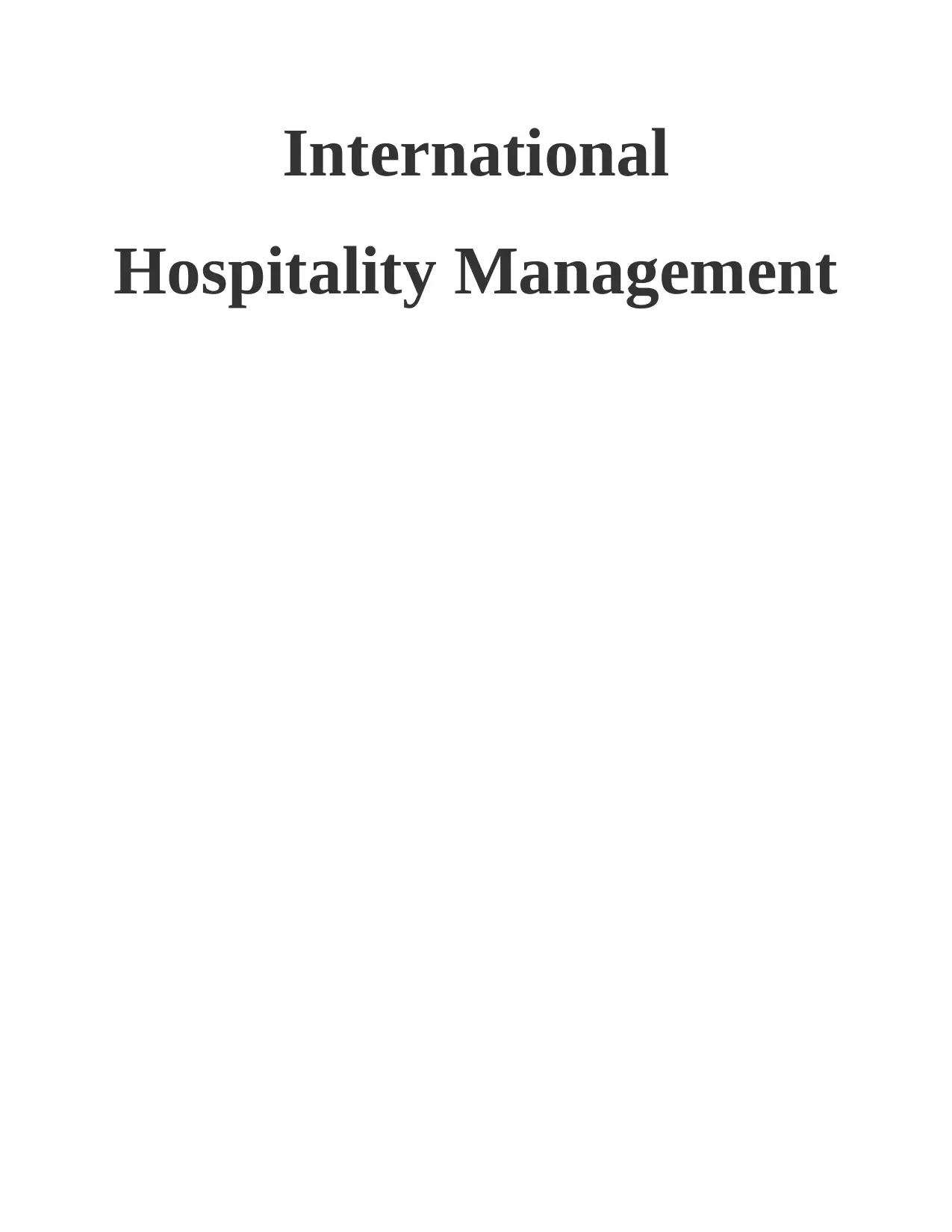
International
Hospitality Management
Hospitality Management
Paraphrase This Document
Need a fresh take? Get an instant paraphrase of this document with our AI Paraphraser
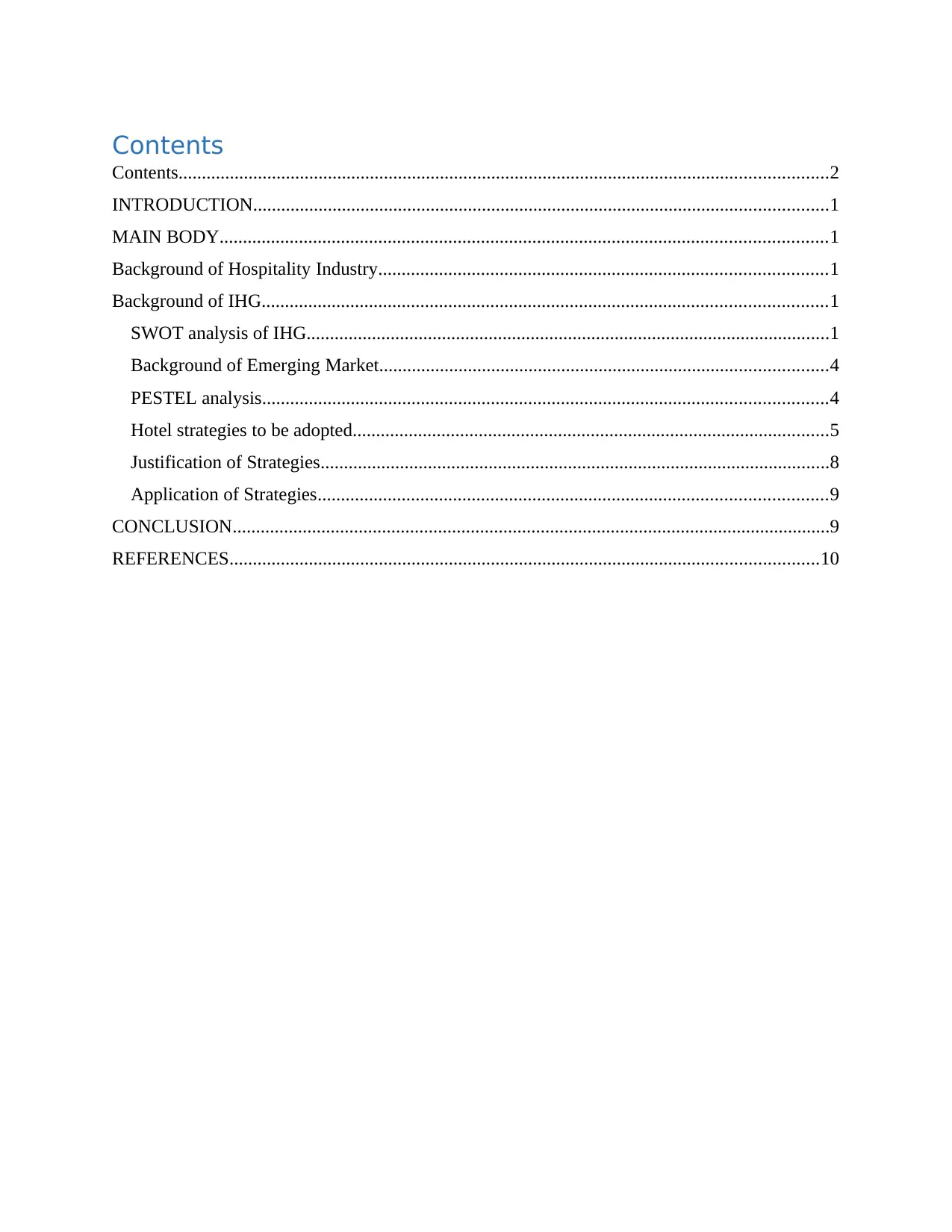
Contents
Contents...........................................................................................................................................2
INTRODUCTION...........................................................................................................................1
MAIN BODY..................................................................................................................................1
Background of Hospitality Industry................................................................................................1
Background of IHG.........................................................................................................................1
SWOT analysis of IHG................................................................................................................1
Background of Emerging Market................................................................................................4
PESTEL analysis.........................................................................................................................4
Hotel strategies to be adopted......................................................................................................5
Justification of Strategies.............................................................................................................8
Application of Strategies.............................................................................................................9
CONCLUSION................................................................................................................................9
REFERENCES..............................................................................................................................10
Contents...........................................................................................................................................2
INTRODUCTION...........................................................................................................................1
MAIN BODY..................................................................................................................................1
Background of Hospitality Industry................................................................................................1
Background of IHG.........................................................................................................................1
SWOT analysis of IHG................................................................................................................1
Background of Emerging Market................................................................................................4
PESTEL analysis.........................................................................................................................4
Hotel strategies to be adopted......................................................................................................5
Justification of Strategies.............................................................................................................8
Application of Strategies.............................................................................................................9
CONCLUSION................................................................................................................................9
REFERENCES..............................................................................................................................10
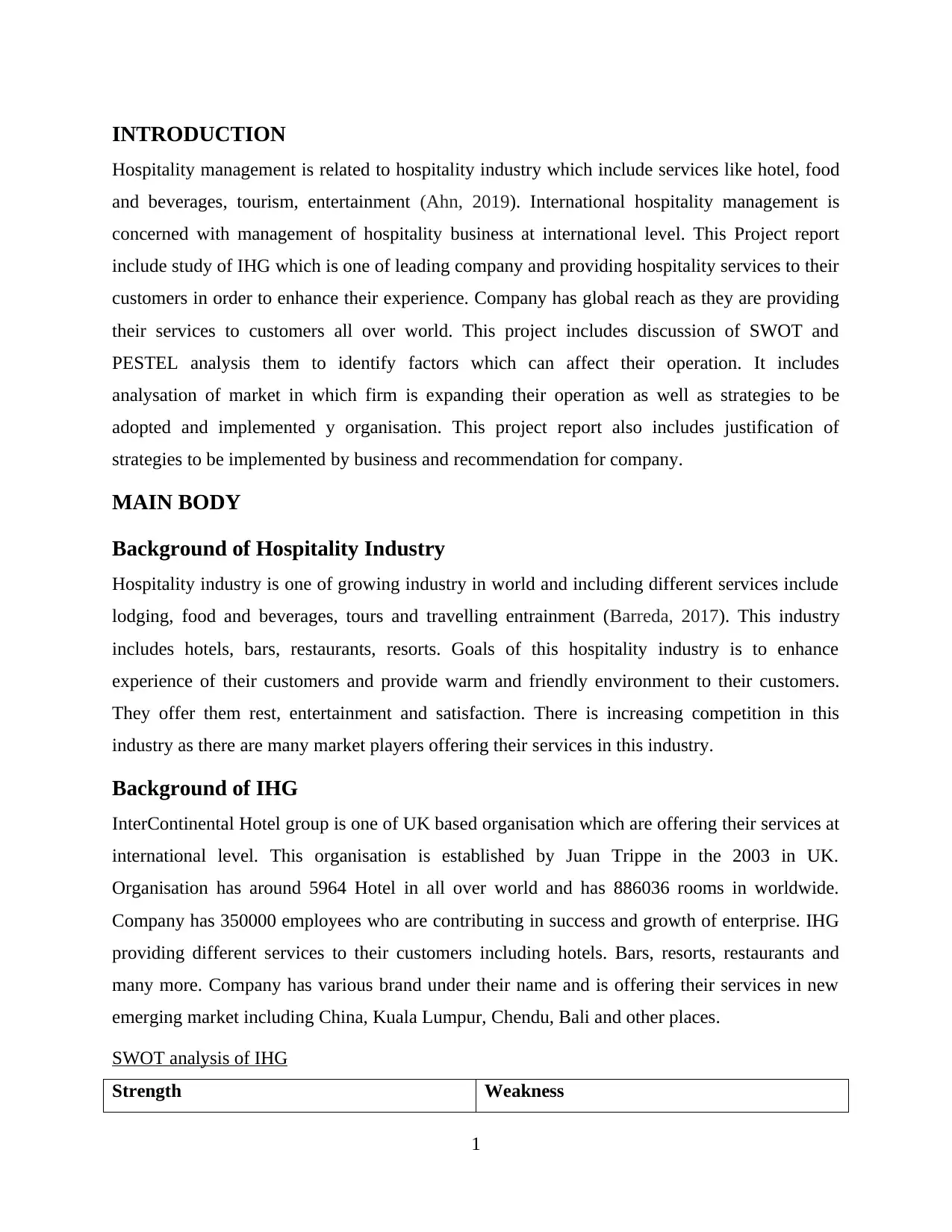
INTRODUCTION
Hospitality management is related to hospitality industry which include services like hotel, food
and beverages, tourism, entertainment (Ahn, 2019). International hospitality management is
concerned with management of hospitality business at international level. This Project report
include study of IHG which is one of leading company and providing hospitality services to their
customers in order to enhance their experience. Company has global reach as they are providing
their services to customers all over world. This project includes discussion of SWOT and
PESTEL analysis them to identify factors which can affect their operation. It includes
analysation of market in which firm is expanding their operation as well as strategies to be
adopted and implemented y organisation. This project report also includes justification of
strategies to be implemented by business and recommendation for company.
MAIN BODY
Background of Hospitality Industry
Hospitality industry is one of growing industry in world and including different services include
lodging, food and beverages, tours and travelling entrainment (Barreda, 2017). This industry
includes hotels, bars, restaurants, resorts. Goals of this hospitality industry is to enhance
experience of their customers and provide warm and friendly environment to their customers.
They offer them rest, entertainment and satisfaction. There is increasing competition in this
industry as there are many market players offering their services in this industry.
Background of IHG
InterContinental Hotel group is one of UK based organisation which are offering their services at
international level. This organisation is established by Juan Trippe in the 2003 in UK.
Organisation has around 5964 Hotel in all over world and has 886036 rooms in worldwide.
Company has 350000 employees who are contributing in success and growth of enterprise. IHG
providing different services to their customers including hotels. Bars, resorts, restaurants and
many more. Company has various brand under their name and is offering their services in new
emerging market including China, Kuala Lumpur, Chendu, Bali and other places.
SWOT analysis of IHG
Strength Weakness
1
Hospitality management is related to hospitality industry which include services like hotel, food
and beverages, tourism, entertainment (Ahn, 2019). International hospitality management is
concerned with management of hospitality business at international level. This Project report
include study of IHG which is one of leading company and providing hospitality services to their
customers in order to enhance their experience. Company has global reach as they are providing
their services to customers all over world. This project includes discussion of SWOT and
PESTEL analysis them to identify factors which can affect their operation. It includes
analysation of market in which firm is expanding their operation as well as strategies to be
adopted and implemented y organisation. This project report also includes justification of
strategies to be implemented by business and recommendation for company.
MAIN BODY
Background of Hospitality Industry
Hospitality industry is one of growing industry in world and including different services include
lodging, food and beverages, tours and travelling entrainment (Barreda, 2017). This industry
includes hotels, bars, restaurants, resorts. Goals of this hospitality industry is to enhance
experience of their customers and provide warm and friendly environment to their customers.
They offer them rest, entertainment and satisfaction. There is increasing competition in this
industry as there are many market players offering their services in this industry.
Background of IHG
InterContinental Hotel group is one of UK based organisation which are offering their services at
international level. This organisation is established by Juan Trippe in the 2003 in UK.
Organisation has around 5964 Hotel in all over world and has 886036 rooms in worldwide.
Company has 350000 employees who are contributing in success and growth of enterprise. IHG
providing different services to their customers including hotels. Bars, resorts, restaurants and
many more. Company has various brand under their name and is offering their services in new
emerging market including China, Kuala Lumpur, Chendu, Bali and other places.
SWOT analysis of IHG
Strength Weakness
1
⊘ This is a preview!⊘
Do you want full access?
Subscribe today to unlock all pages.

Trusted by 1+ million students worldwide
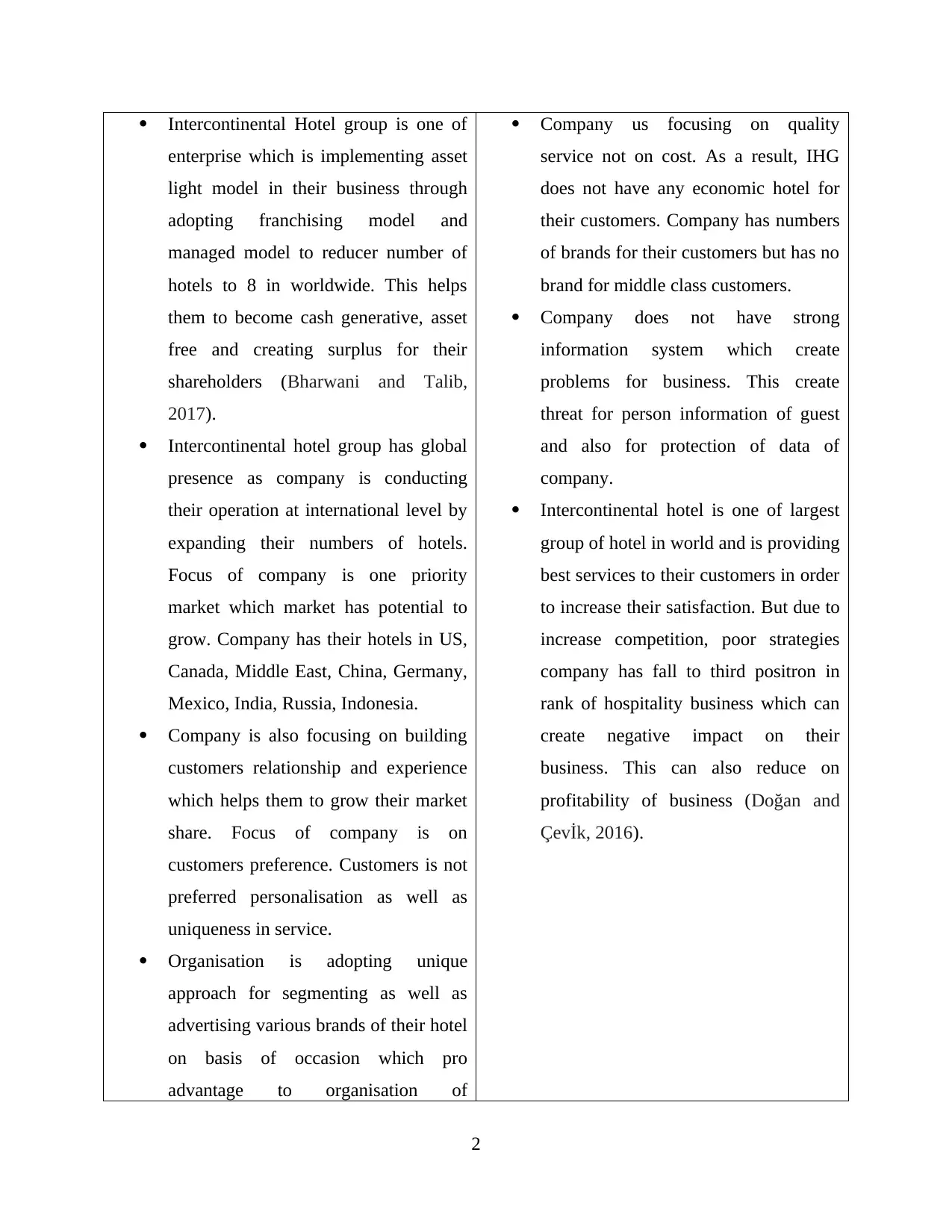
Intercontinental Hotel group is one of
enterprise which is implementing asset
light model in their business through
adopting franchising model and
managed model to reducer number of
hotels to 8 in worldwide. This helps
them to become cash generative, asset
free and creating surplus for their
shareholders (Bharwani and Talib,
2017).
Intercontinental hotel group has global
presence as company is conducting
their operation at international level by
expanding their numbers of hotels.
Focus of company is one priority
market which market has potential to
grow. Company has their hotels in US,
Canada, Middle East, China, Germany,
Mexico, India, Russia, Indonesia.
Company is also focusing on building
customers relationship and experience
which helps them to grow their market
share. Focus of company is on
customers preference. Customers is not
preferred personalisation as well as
uniqueness in service.
Organisation is adopting unique
approach for segmenting as well as
advertising various brands of their hotel
on basis of occasion which pro
advantage to organisation of
Company us focusing on quality
service not on cost. As a result, IHG
does not have any economic hotel for
their customers. Company has numbers
of brands for their customers but has no
brand for middle class customers.
Company does not have strong
information system which create
problems for business. This create
threat for person information of guest
and also for protection of data of
company.
Intercontinental hotel is one of largest
group of hotel in world and is providing
best services to their customers in order
to increase their satisfaction. But due to
increase competition, poor strategies
company has fall to third positron in
rank of hospitality business which can
create negative impact on their
business. This can also reduce on
profitability of business (Doğan and
Çevİk, 2016).
2
enterprise which is implementing asset
light model in their business through
adopting franchising model and
managed model to reducer number of
hotels to 8 in worldwide. This helps
them to become cash generative, asset
free and creating surplus for their
shareholders (Bharwani and Talib,
2017).
Intercontinental hotel group has global
presence as company is conducting
their operation at international level by
expanding their numbers of hotels.
Focus of company is one priority
market which market has potential to
grow. Company has their hotels in US,
Canada, Middle East, China, Germany,
Mexico, India, Russia, Indonesia.
Company is also focusing on building
customers relationship and experience
which helps them to grow their market
share. Focus of company is on
customers preference. Customers is not
preferred personalisation as well as
uniqueness in service.
Organisation is adopting unique
approach for segmenting as well as
advertising various brands of their hotel
on basis of occasion which pro
advantage to organisation of
Company us focusing on quality
service not on cost. As a result, IHG
does not have any economic hotel for
their customers. Company has numbers
of brands for their customers but has no
brand for middle class customers.
Company does not have strong
information system which create
problems for business. This create
threat for person information of guest
and also for protection of data of
company.
Intercontinental hotel is one of largest
group of hotel in world and is providing
best services to their customers in order
to increase their satisfaction. But due to
increase competition, poor strategies
company has fall to third positron in
rank of hospitality business which can
create negative impact on their
business. This can also reduce on
profitability of business (Doğan and
Çevİk, 2016).
2
Paraphrase This Document
Need a fresh take? Get an instant paraphrase of this document with our AI Paraphraser
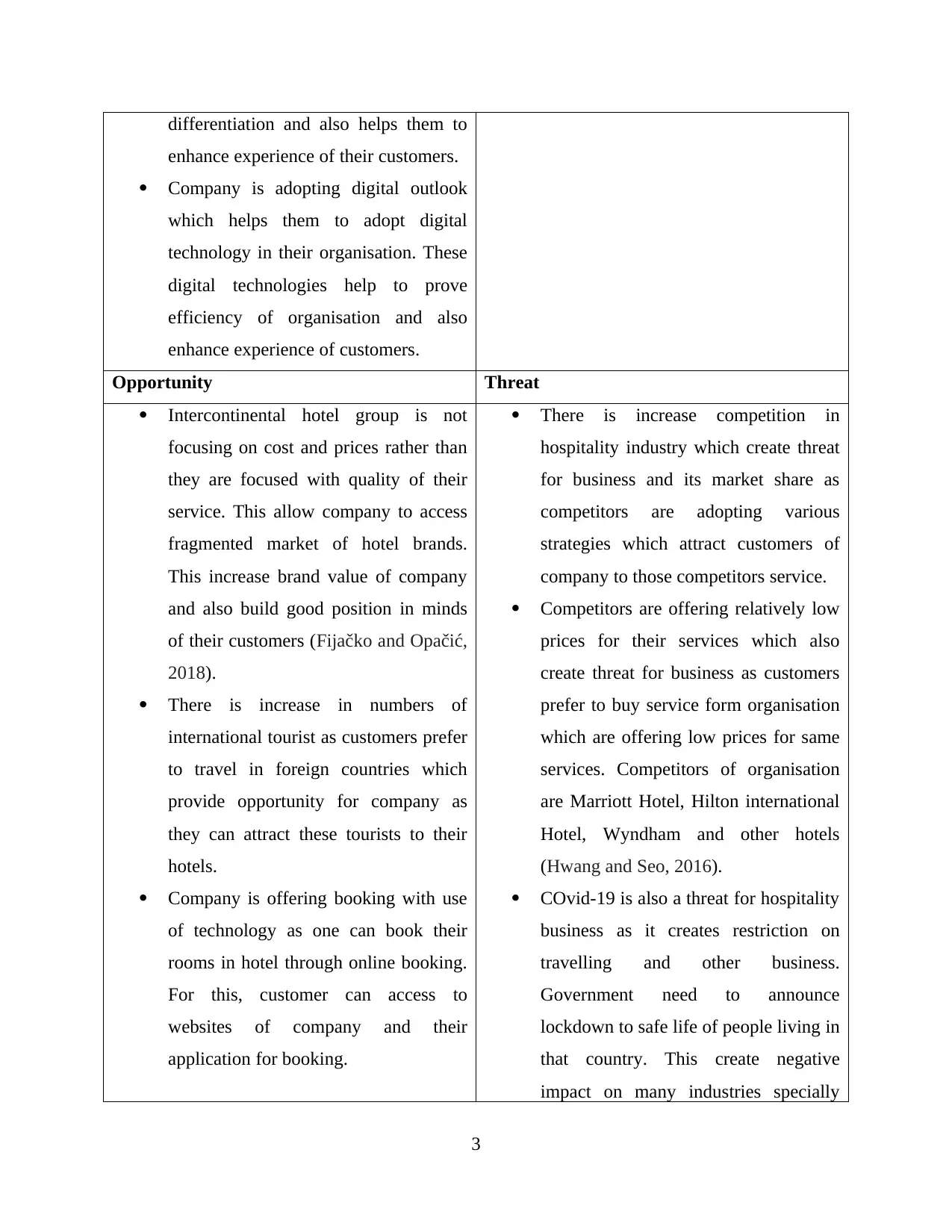
differentiation and also helps them to
enhance experience of their customers.
Company is adopting digital outlook
which helps them to adopt digital
technology in their organisation. These
digital technologies help to prove
efficiency of organisation and also
enhance experience of customers.
Opportunity Threat
Intercontinental hotel group is not
focusing on cost and prices rather than
they are focused with quality of their
service. This allow company to access
fragmented market of hotel brands.
This increase brand value of company
and also build good position in minds
of their customers (Fijačko and Opačić,
2018).
There is increase in numbers of
international tourist as customers prefer
to travel in foreign countries which
provide opportunity for company as
they can attract these tourists to their
hotels.
Company is offering booking with use
of technology as one can book their
rooms in hotel through online booking.
For this, customer can access to
websites of company and their
application for booking.
There is increase competition in
hospitality industry which create threat
for business and its market share as
competitors are adopting various
strategies which attract customers of
company to those competitors service.
Competitors are offering relatively low
prices for their services which also
create threat for business as customers
prefer to buy service form organisation
which are offering low prices for same
services. Competitors of organisation
are Marriott Hotel, Hilton international
Hotel, Wyndham and other hotels
(Hwang and Seo, 2016).
COvid-19 is also a threat for hospitality
business as it creates restriction on
travelling and other business.
Government need to announce
lockdown to safe life of people living in
that country. This create negative
impact on many industries specially
3
enhance experience of their customers.
Company is adopting digital outlook
which helps them to adopt digital
technology in their organisation. These
digital technologies help to prove
efficiency of organisation and also
enhance experience of customers.
Opportunity Threat
Intercontinental hotel group is not
focusing on cost and prices rather than
they are focused with quality of their
service. This allow company to access
fragmented market of hotel brands.
This increase brand value of company
and also build good position in minds
of their customers (Fijačko and Opačić,
2018).
There is increase in numbers of
international tourist as customers prefer
to travel in foreign countries which
provide opportunity for company as
they can attract these tourists to their
hotels.
Company is offering booking with use
of technology as one can book their
rooms in hotel through online booking.
For this, customer can access to
websites of company and their
application for booking.
There is increase competition in
hospitality industry which create threat
for business and its market share as
competitors are adopting various
strategies which attract customers of
company to those competitors service.
Competitors are offering relatively low
prices for their services which also
create threat for business as customers
prefer to buy service form organisation
which are offering low prices for same
services. Competitors of organisation
are Marriott Hotel, Hilton international
Hotel, Wyndham and other hotels
(Hwang and Seo, 2016).
COvid-19 is also a threat for hospitality
business as it creates restriction on
travelling and other business.
Government need to announce
lockdown to safe life of people living in
that country. This create negative
impact on many industries specially
3
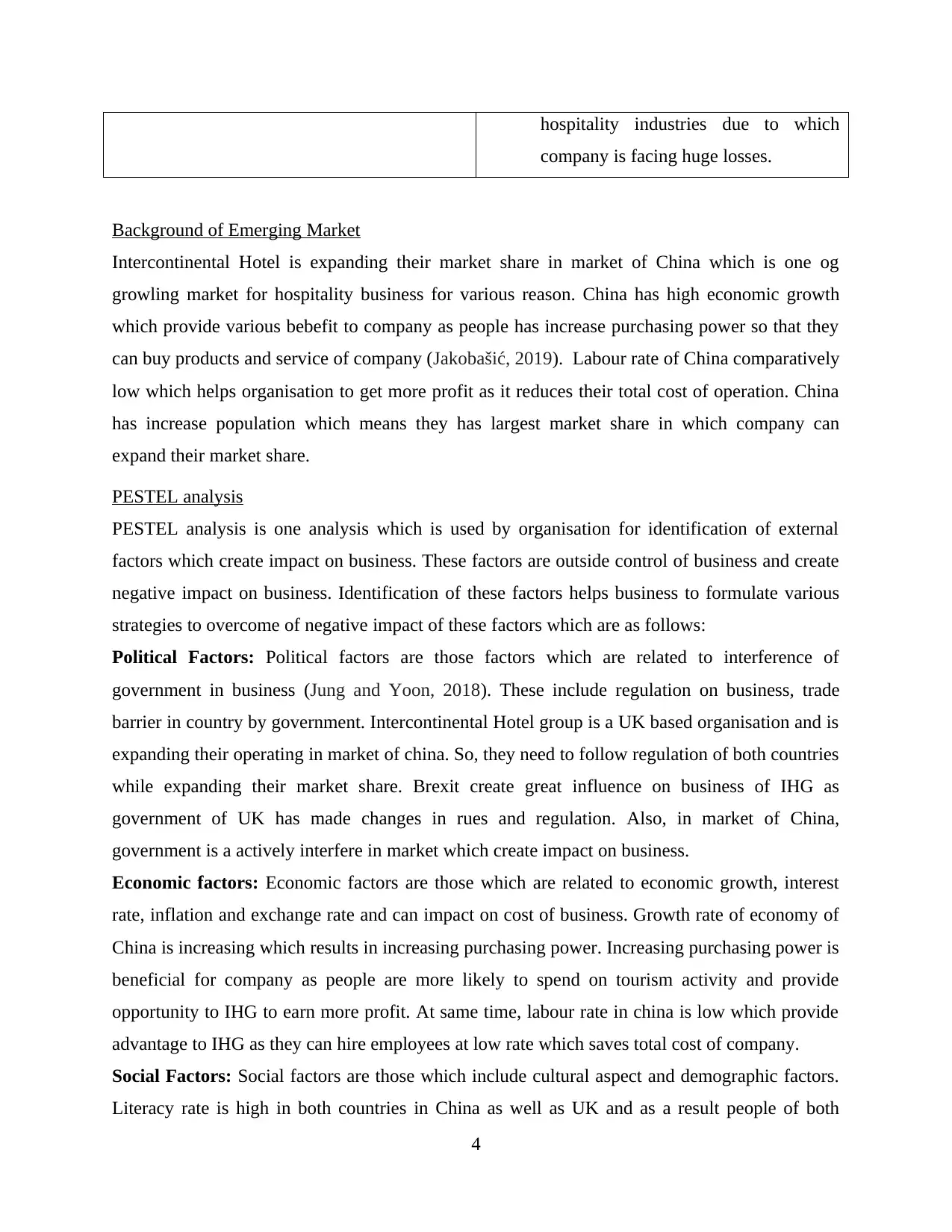
hospitality industries due to which
company is facing huge losses.
Background of Emerging Market
Intercontinental Hotel is expanding their market share in market of China which is one og
growling market for hospitality business for various reason. China has high economic growth
which provide various bebefit to company as people has increase purchasing power so that they
can buy products and service of company (Jakobašić, 2019). Labour rate of China comparatively
low which helps organisation to get more profit as it reduces their total cost of operation. China
has increase population which means they has largest market share in which company can
expand their market share.
PESTEL analysis
PESTEL analysis is one analysis which is used by organisation for identification of external
factors which create impact on business. These factors are outside control of business and create
negative impact on business. Identification of these factors helps business to formulate various
strategies to overcome of negative impact of these factors which are as follows:
Political Factors: Political factors are those factors which are related to interference of
government in business (Jung and Yoon, 2018). These include regulation on business, trade
barrier in country by government. Intercontinental Hotel group is a UK based organisation and is
expanding their operating in market of china. So, they need to follow regulation of both countries
while expanding their market share. Brexit create great influence on business of IHG as
government of UK has made changes in rues and regulation. Also, in market of China,
government is a actively interfere in market which create impact on business.
Economic factors: Economic factors are those which are related to economic growth, interest
rate, inflation and exchange rate and can impact on cost of business. Growth rate of economy of
China is increasing which results in increasing purchasing power. Increasing purchasing power is
beneficial for company as people are more likely to spend on tourism activity and provide
opportunity to IHG to earn more profit. At same time, labour rate in china is low which provide
advantage to IHG as they can hire employees at low rate which saves total cost of company.
Social Factors: Social factors are those which include cultural aspect and demographic factors.
Literacy rate is high in both countries in China as well as UK and as a result people of both
4
company is facing huge losses.
Background of Emerging Market
Intercontinental Hotel is expanding their market share in market of China which is one og
growling market for hospitality business for various reason. China has high economic growth
which provide various bebefit to company as people has increase purchasing power so that they
can buy products and service of company (Jakobašić, 2019). Labour rate of China comparatively
low which helps organisation to get more profit as it reduces their total cost of operation. China
has increase population which means they has largest market share in which company can
expand their market share.
PESTEL analysis
PESTEL analysis is one analysis which is used by organisation for identification of external
factors which create impact on business. These factors are outside control of business and create
negative impact on business. Identification of these factors helps business to formulate various
strategies to overcome of negative impact of these factors which are as follows:
Political Factors: Political factors are those factors which are related to interference of
government in business (Jung and Yoon, 2018). These include regulation on business, trade
barrier in country by government. Intercontinental Hotel group is a UK based organisation and is
expanding their operating in market of china. So, they need to follow regulation of both countries
while expanding their market share. Brexit create great influence on business of IHG as
government of UK has made changes in rues and regulation. Also, in market of China,
government is a actively interfere in market which create impact on business.
Economic factors: Economic factors are those which are related to economic growth, interest
rate, inflation and exchange rate and can impact on cost of business. Growth rate of economy of
China is increasing which results in increasing purchasing power. Increasing purchasing power is
beneficial for company as people are more likely to spend on tourism activity and provide
opportunity to IHG to earn more profit. At same time, labour rate in china is low which provide
advantage to IHG as they can hire employees at low rate which saves total cost of company.
Social Factors: Social factors are those which include cultural aspect and demographic factors.
Literacy rate is high in both countries in China as well as UK and as a result people of both
4
⊘ This is a preview!⊘
Do you want full access?
Subscribe today to unlock all pages.

Trusted by 1+ million students worldwide
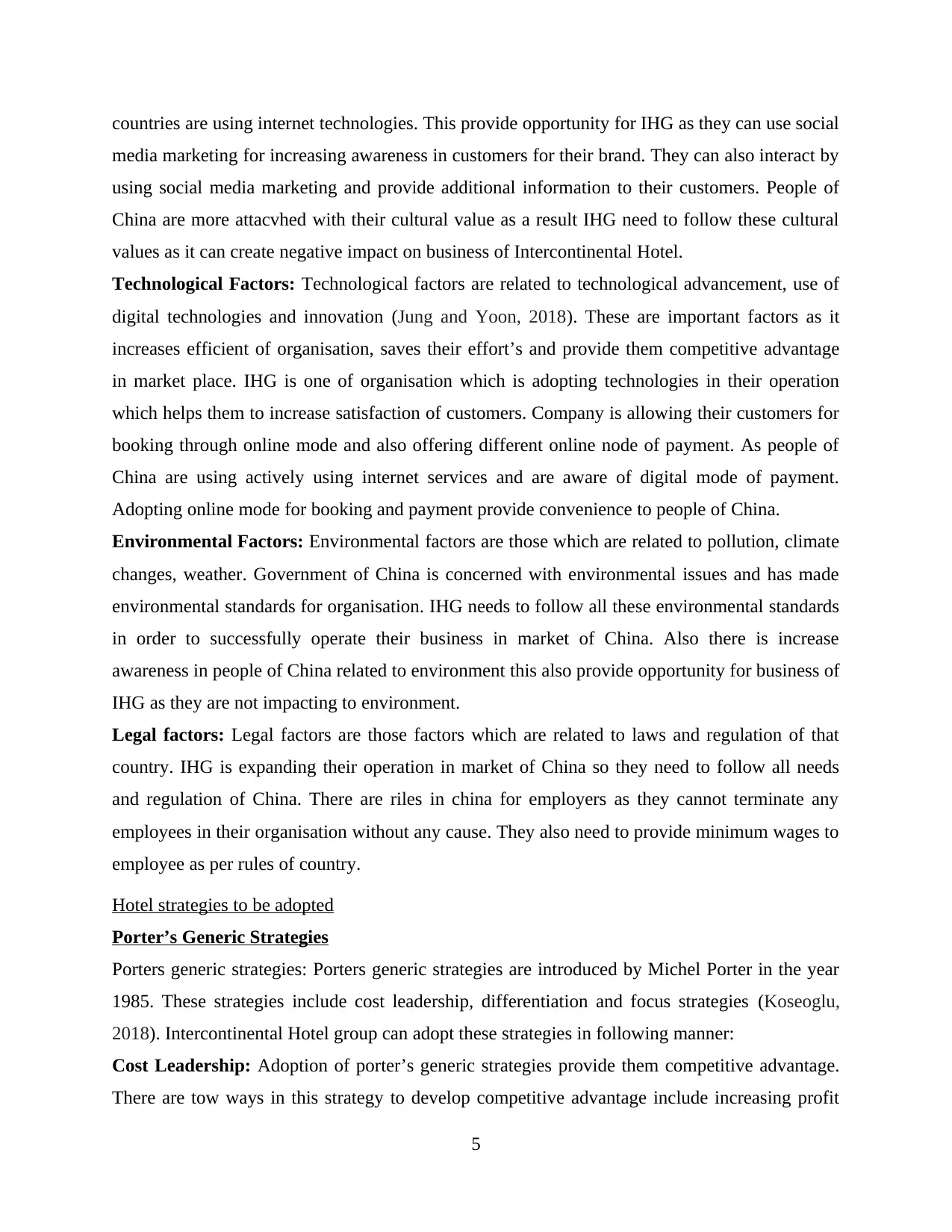
countries are using internet technologies. This provide opportunity for IHG as they can use social
media marketing for increasing awareness in customers for their brand. They can also interact by
using social media marketing and provide additional information to their customers. People of
China are more attacvhed with their cultural value as a result IHG need to follow these cultural
values as it can create negative impact on business of Intercontinental Hotel.
Technological Factors: Technological factors are related to technological advancement, use of
digital technologies and innovation (Jung and Yoon, 2018). These are important factors as it
increases efficient of organisation, saves their effort’s and provide them competitive advantage
in market place. IHG is one of organisation which is adopting technologies in their operation
which helps them to increase satisfaction of customers. Company is allowing their customers for
booking through online mode and also offering different online node of payment. As people of
China are using actively using internet services and are aware of digital mode of payment.
Adopting online mode for booking and payment provide convenience to people of China.
Environmental Factors: Environmental factors are those which are related to pollution, climate
changes, weather. Government of China is concerned with environmental issues and has made
environmental standards for organisation. IHG needs to follow all these environmental standards
in order to successfully operate their business in market of China. Also there is increase
awareness in people of China related to environment this also provide opportunity for business of
IHG as they are not impacting to environment.
Legal factors: Legal factors are those factors which are related to laws and regulation of that
country. IHG is expanding their operation in market of China so they need to follow all needs
and regulation of China. There are riles in china for employers as they cannot terminate any
employees in their organisation without any cause. They also need to provide minimum wages to
employee as per rules of country.
Hotel strategies to be adopted
Porter’s Generic Strategies
Porters generic strategies: Porters generic strategies are introduced by Michel Porter in the year
1985. These strategies include cost leadership, differentiation and focus strategies (Koseoglu,
2018). Intercontinental Hotel group can adopt these strategies in following manner:
Cost Leadership: Adoption of porter’s generic strategies provide them competitive advantage.
There are tow ways in this strategy to develop competitive advantage include increasing profit
5
media marketing for increasing awareness in customers for their brand. They can also interact by
using social media marketing and provide additional information to their customers. People of
China are more attacvhed with their cultural value as a result IHG need to follow these cultural
values as it can create negative impact on business of Intercontinental Hotel.
Technological Factors: Technological factors are related to technological advancement, use of
digital technologies and innovation (Jung and Yoon, 2018). These are important factors as it
increases efficient of organisation, saves their effort’s and provide them competitive advantage
in market place. IHG is one of organisation which is adopting technologies in their operation
which helps them to increase satisfaction of customers. Company is allowing their customers for
booking through online mode and also offering different online node of payment. As people of
China are using actively using internet services and are aware of digital mode of payment.
Adopting online mode for booking and payment provide convenience to people of China.
Environmental Factors: Environmental factors are those which are related to pollution, climate
changes, weather. Government of China is concerned with environmental issues and has made
environmental standards for organisation. IHG needs to follow all these environmental standards
in order to successfully operate their business in market of China. Also there is increase
awareness in people of China related to environment this also provide opportunity for business of
IHG as they are not impacting to environment.
Legal factors: Legal factors are those factors which are related to laws and regulation of that
country. IHG is expanding their operation in market of China so they need to follow all needs
and regulation of China. There are riles in china for employers as they cannot terminate any
employees in their organisation without any cause. They also need to provide minimum wages to
employee as per rules of country.
Hotel strategies to be adopted
Porter’s Generic Strategies
Porters generic strategies: Porters generic strategies are introduced by Michel Porter in the year
1985. These strategies include cost leadership, differentiation and focus strategies (Koseoglu,
2018). Intercontinental Hotel group can adopt these strategies in following manner:
Cost Leadership: Adoption of porter’s generic strategies provide them competitive advantage.
There are tow ways in this strategy to develop competitive advantage include increasing profit
5
Paraphrase This Document
Need a fresh take? Get an instant paraphrase of this document with our AI Paraphraser
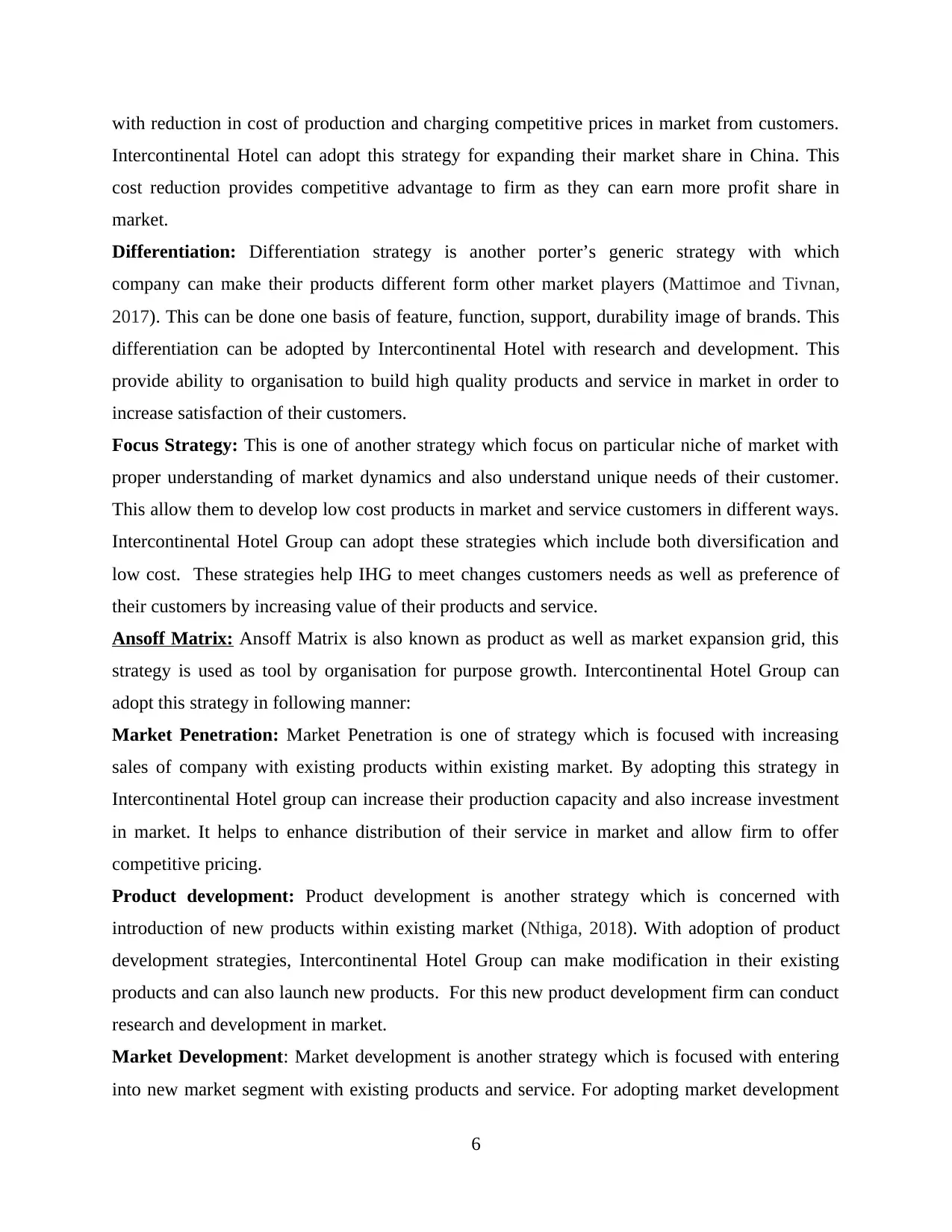
with reduction in cost of production and charging competitive prices in market from customers.
Intercontinental Hotel can adopt this strategy for expanding their market share in China. This
cost reduction provides competitive advantage to firm as they can earn more profit share in
market.
Differentiation: Differentiation strategy is another porter’s generic strategy with which
company can make their products different form other market players (Mattimoe and Tivnan,
2017). This can be done one basis of feature, function, support, durability image of brands. This
differentiation can be adopted by Intercontinental Hotel with research and development. This
provide ability to organisation to build high quality products and service in market in order to
increase satisfaction of their customers.
Focus Strategy: This is one of another strategy which focus on particular niche of market with
proper understanding of market dynamics and also understand unique needs of their customer.
This allow them to develop low cost products in market and service customers in different ways.
Intercontinental Hotel Group can adopt these strategies which include both diversification and
low cost. These strategies help IHG to meet changes customers needs as well as preference of
their customers by increasing value of their products and service.
Ansoff Matrix: Ansoff Matrix is also known as product as well as market expansion grid, this
strategy is used as tool by organisation for purpose growth. Intercontinental Hotel Group can
adopt this strategy in following manner:
Market Penetration: Market Penetration is one of strategy which is focused with increasing
sales of company with existing products within existing market. By adopting this strategy in
Intercontinental Hotel group can increase their production capacity and also increase investment
in market. It helps to enhance distribution of their service in market and allow firm to offer
competitive pricing.
Product development: Product development is another strategy which is concerned with
introduction of new products within existing market (Nthiga, 2018). With adoption of product
development strategies, Intercontinental Hotel Group can make modification in their existing
products and can also launch new products. For this new product development firm can conduct
research and development in market.
Market Development: Market development is another strategy which is focused with entering
into new market segment with existing products and service. For adopting market development
6
Intercontinental Hotel can adopt this strategy for expanding their market share in China. This
cost reduction provides competitive advantage to firm as they can earn more profit share in
market.
Differentiation: Differentiation strategy is another porter’s generic strategy with which
company can make their products different form other market players (Mattimoe and Tivnan,
2017). This can be done one basis of feature, function, support, durability image of brands. This
differentiation can be adopted by Intercontinental Hotel with research and development. This
provide ability to organisation to build high quality products and service in market in order to
increase satisfaction of their customers.
Focus Strategy: This is one of another strategy which focus on particular niche of market with
proper understanding of market dynamics and also understand unique needs of their customer.
This allow them to develop low cost products in market and service customers in different ways.
Intercontinental Hotel Group can adopt these strategies which include both diversification and
low cost. These strategies help IHG to meet changes customers needs as well as preference of
their customers by increasing value of their products and service.
Ansoff Matrix: Ansoff Matrix is also known as product as well as market expansion grid, this
strategy is used as tool by organisation for purpose growth. Intercontinental Hotel Group can
adopt this strategy in following manner:
Market Penetration: Market Penetration is one of strategy which is focused with increasing
sales of company with existing products within existing market. By adopting this strategy in
Intercontinental Hotel group can increase their production capacity and also increase investment
in market. It helps to enhance distribution of their service in market and allow firm to offer
competitive pricing.
Product development: Product development is another strategy which is concerned with
introduction of new products within existing market (Nthiga, 2018). With adoption of product
development strategies, Intercontinental Hotel Group can make modification in their existing
products and can also launch new products. For this new product development firm can conduct
research and development in market.
Market Development: Market development is another strategy which is focused with entering
into new market segment with existing products and service. For adopting market development
6
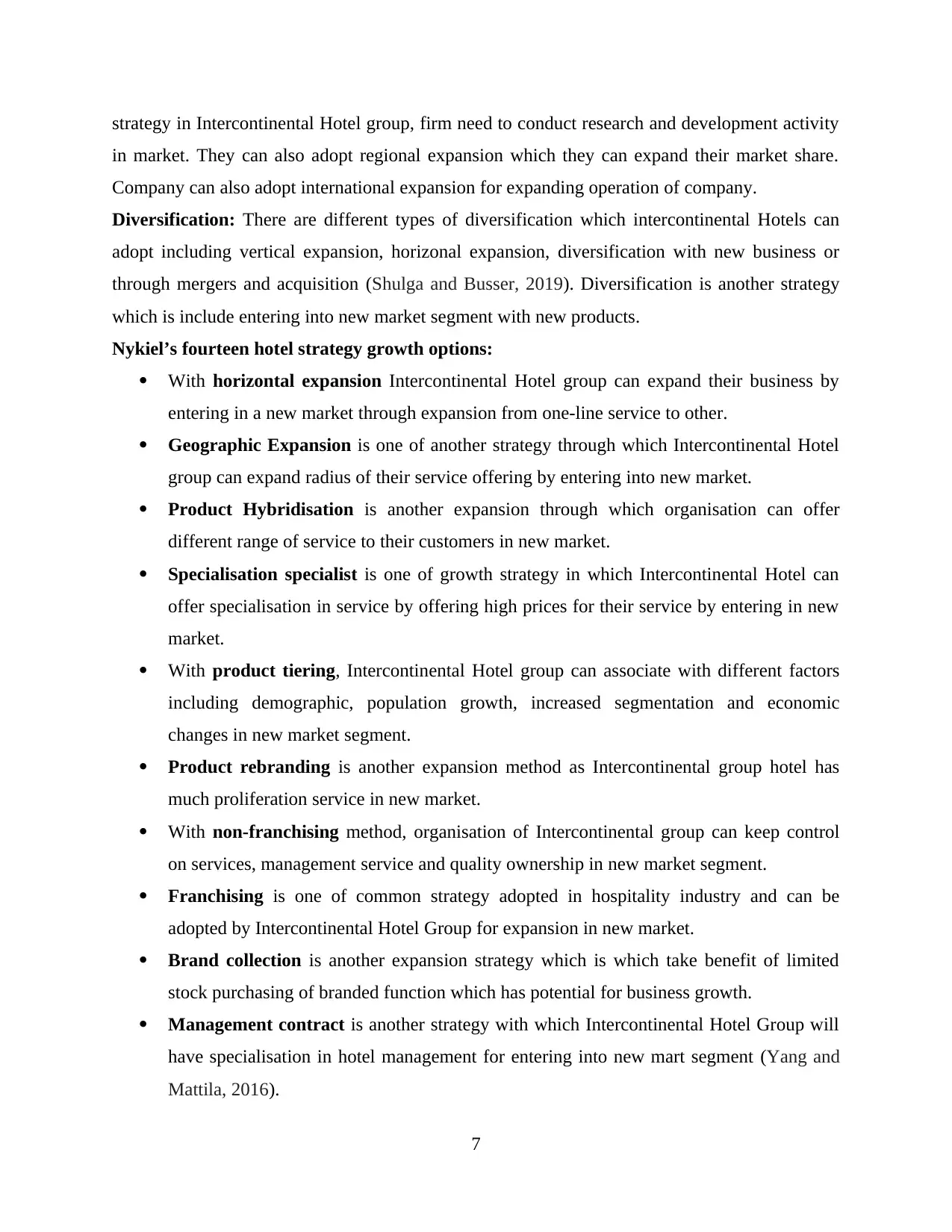
strategy in Intercontinental Hotel group, firm need to conduct research and development activity
in market. They can also adopt regional expansion which they can expand their market share.
Company can also adopt international expansion for expanding operation of company.
Diversification: There are different types of diversification which intercontinental Hotels can
adopt including vertical expansion, horizonal expansion, diversification with new business or
through mergers and acquisition (Shulga and Busser, 2019). Diversification is another strategy
which is include entering into new market segment with new products.
Nykiel’s fourteen hotel strategy growth options:
With horizontal expansion Intercontinental Hotel group can expand their business by
entering in a new market through expansion from one-line service to other.
Geographic Expansion is one of another strategy through which Intercontinental Hotel
group can expand radius of their service offering by entering into new market.
Product Hybridisation is another expansion through which organisation can offer
different range of service to their customers in new market.
Specialisation specialist is one of growth strategy in which Intercontinental Hotel can
offer specialisation in service by offering high prices for their service by entering in new
market.
With product tiering, Intercontinental Hotel group can associate with different factors
including demographic, population growth, increased segmentation and economic
changes in new market segment.
Product rebranding is another expansion method as Intercontinental group hotel has
much proliferation service in new market.
With non-franchising method, organisation of Intercontinental group can keep control
on services, management service and quality ownership in new market segment.
Franchising is one of common strategy adopted in hospitality industry and can be
adopted by Intercontinental Hotel Group for expansion in new market.
Brand collection is another expansion strategy which is which take benefit of limited
stock purchasing of branded function which has potential for business growth.
Management contract is another strategy with which Intercontinental Hotel Group will
have specialisation in hotel management for entering into new mart segment (Yang and
Mattila, 2016).
7
in market. They can also adopt regional expansion which they can expand their market share.
Company can also adopt international expansion for expanding operation of company.
Diversification: There are different types of diversification which intercontinental Hotels can
adopt including vertical expansion, horizonal expansion, diversification with new business or
through mergers and acquisition (Shulga and Busser, 2019). Diversification is another strategy
which is include entering into new market segment with new products.
Nykiel’s fourteen hotel strategy growth options:
With horizontal expansion Intercontinental Hotel group can expand their business by
entering in a new market through expansion from one-line service to other.
Geographic Expansion is one of another strategy through which Intercontinental Hotel
group can expand radius of their service offering by entering into new market.
Product Hybridisation is another expansion through which organisation can offer
different range of service to their customers in new market.
Specialisation specialist is one of growth strategy in which Intercontinental Hotel can
offer specialisation in service by offering high prices for their service by entering in new
market.
With product tiering, Intercontinental Hotel group can associate with different factors
including demographic, population growth, increased segmentation and economic
changes in new market segment.
Product rebranding is another expansion method as Intercontinental group hotel has
much proliferation service in new market.
With non-franchising method, organisation of Intercontinental group can keep control
on services, management service and quality ownership in new market segment.
Franchising is one of common strategy adopted in hospitality industry and can be
adopted by Intercontinental Hotel Group for expansion in new market.
Brand collection is another expansion strategy which is which take benefit of limited
stock purchasing of branded function which has potential for business growth.
Management contract is another strategy with which Intercontinental Hotel Group will
have specialisation in hotel management for entering into new mart segment (Yang and
Mattila, 2016).
7
⊘ This is a preview!⊘
Do you want full access?
Subscribe today to unlock all pages.

Trusted by 1+ million students worldwide
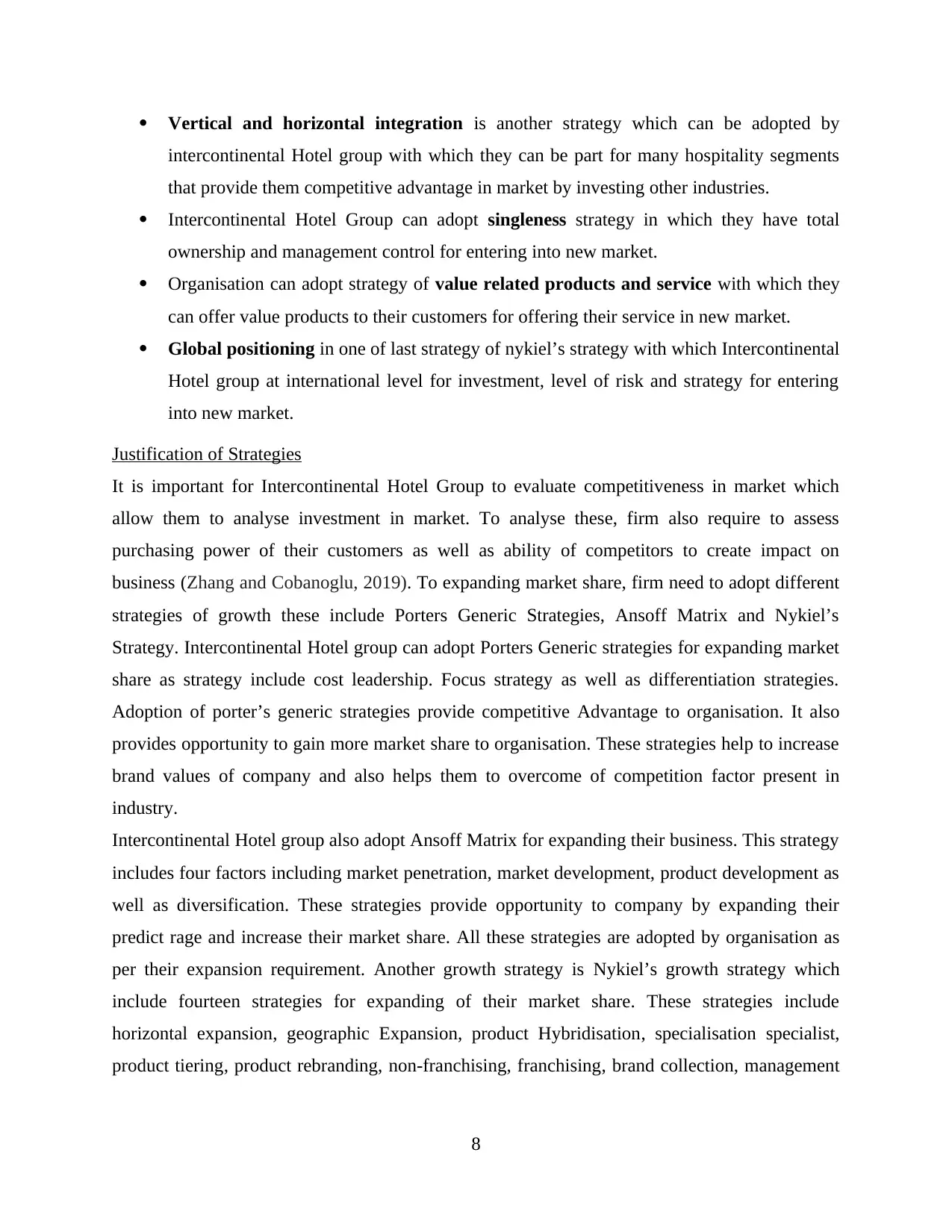
Vertical and horizontal integration is another strategy which can be adopted by
intercontinental Hotel group with which they can be part for many hospitality segments
that provide them competitive advantage in market by investing other industries.
Intercontinental Hotel Group can adopt singleness strategy in which they have total
ownership and management control for entering into new market.
Organisation can adopt strategy of value related products and service with which they
can offer value products to their customers for offering their service in new market.
Global positioning in one of last strategy of nykiel’s strategy with which Intercontinental
Hotel group at international level for investment, level of risk and strategy for entering
into new market.
Justification of Strategies
It is important for Intercontinental Hotel Group to evaluate competitiveness in market which
allow them to analyse investment in market. To analyse these, firm also require to assess
purchasing power of their customers as well as ability of competitors to create impact on
business (Zhang and Cobanoglu, 2019). To expanding market share, firm need to adopt different
strategies of growth these include Porters Generic Strategies, Ansoff Matrix and Nykiel’s
Strategy. Intercontinental Hotel group can adopt Porters Generic strategies for expanding market
share as strategy include cost leadership. Focus strategy as well as differentiation strategies.
Adoption of porter’s generic strategies provide competitive Advantage to organisation. It also
provides opportunity to gain more market share to organisation. These strategies help to increase
brand values of company and also helps them to overcome of competition factor present in
industry.
Intercontinental Hotel group also adopt Ansoff Matrix for expanding their business. This strategy
includes four factors including market penetration, market development, product development as
well as diversification. These strategies provide opportunity to company by expanding their
predict rage and increase their market share. All these strategies are adopted by organisation as
per their expansion requirement. Another growth strategy is Nykiel’s growth strategy which
include fourteen strategies for expanding of their market share. These strategies include
horizontal expansion, geographic Expansion, product Hybridisation, specialisation specialist,
product tiering, product rebranding, non-franchising, franchising, brand collection, management
8
intercontinental Hotel group with which they can be part for many hospitality segments
that provide them competitive advantage in market by investing other industries.
Intercontinental Hotel Group can adopt singleness strategy in which they have total
ownership and management control for entering into new market.
Organisation can adopt strategy of value related products and service with which they
can offer value products to their customers for offering their service in new market.
Global positioning in one of last strategy of nykiel’s strategy with which Intercontinental
Hotel group at international level for investment, level of risk and strategy for entering
into new market.
Justification of Strategies
It is important for Intercontinental Hotel Group to evaluate competitiveness in market which
allow them to analyse investment in market. To analyse these, firm also require to assess
purchasing power of their customers as well as ability of competitors to create impact on
business (Zhang and Cobanoglu, 2019). To expanding market share, firm need to adopt different
strategies of growth these include Porters Generic Strategies, Ansoff Matrix and Nykiel’s
Strategy. Intercontinental Hotel group can adopt Porters Generic strategies for expanding market
share as strategy include cost leadership. Focus strategy as well as differentiation strategies.
Adoption of porter’s generic strategies provide competitive Advantage to organisation. It also
provides opportunity to gain more market share to organisation. These strategies help to increase
brand values of company and also helps them to overcome of competition factor present in
industry.
Intercontinental Hotel group also adopt Ansoff Matrix for expanding their business. This strategy
includes four factors including market penetration, market development, product development as
well as diversification. These strategies provide opportunity to company by expanding their
predict rage and increase their market share. All these strategies are adopted by organisation as
per their expansion requirement. Another growth strategy is Nykiel’s growth strategy which
include fourteen strategies for expanding of their market share. These strategies include
horizontal expansion, geographic Expansion, product Hybridisation, specialisation specialist,
product tiering, product rebranding, non-franchising, franchising, brand collection, management
8
Paraphrase This Document
Need a fresh take? Get an instant paraphrase of this document with our AI Paraphraser
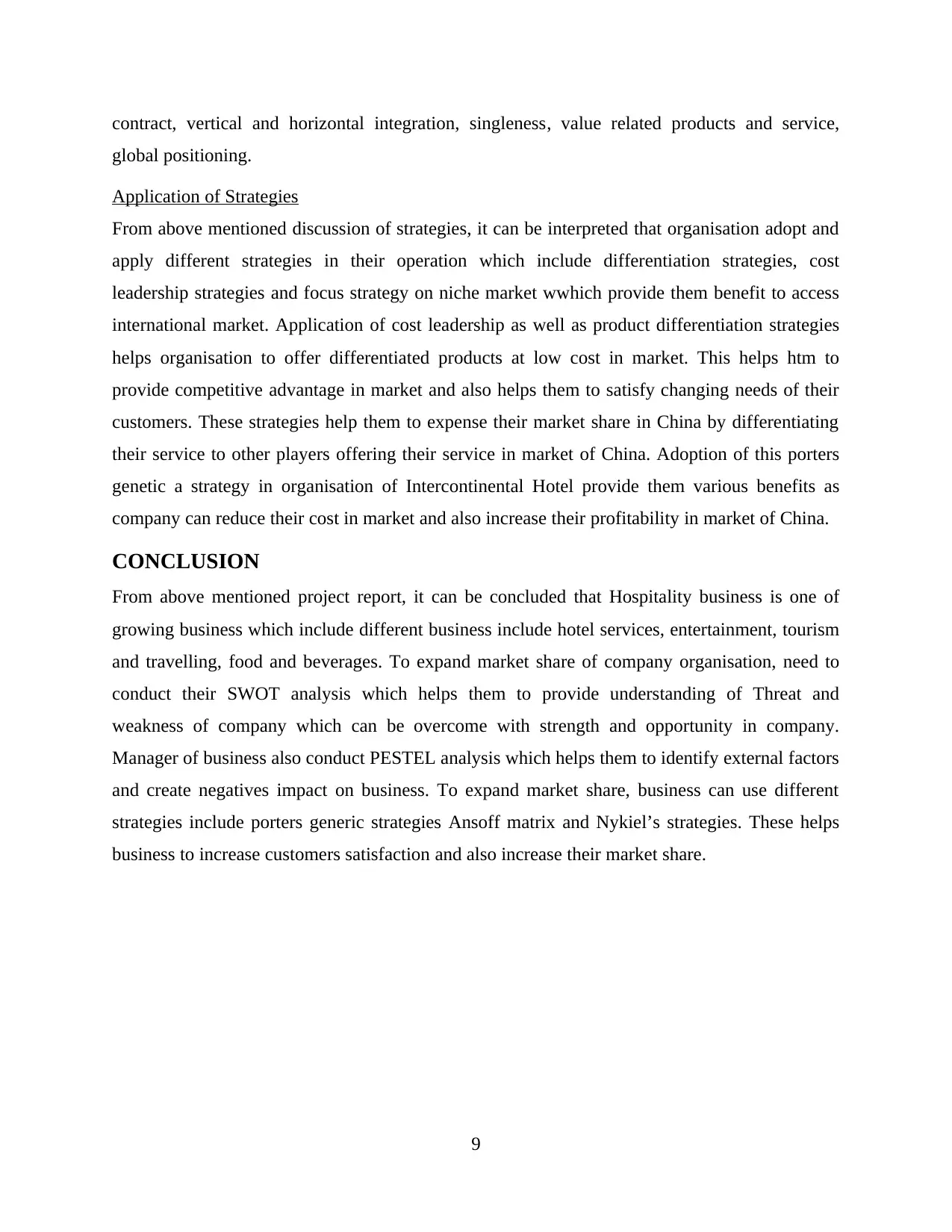
contract, vertical and horizontal integration, singleness, value related products and service,
global positioning.
Application of Strategies
From above mentioned discussion of strategies, it can be interpreted that organisation adopt and
apply different strategies in their operation which include differentiation strategies, cost
leadership strategies and focus strategy on niche market wwhich provide them benefit to access
international market. Application of cost leadership as well as product differentiation strategies
helps organisation to offer differentiated products at low cost in market. This helps htm to
provide competitive advantage in market and also helps them to satisfy changing needs of their
customers. These strategies help them to expense their market share in China by differentiating
their service to other players offering their service in market of China. Adoption of this porters
genetic a strategy in organisation of Intercontinental Hotel provide them various benefits as
company can reduce their cost in market and also increase their profitability in market of China.
CONCLUSION
From above mentioned project report, it can be concluded that Hospitality business is one of
growing business which include different business include hotel services, entertainment, tourism
and travelling, food and beverages. To expand market share of company organisation, need to
conduct their SWOT analysis which helps them to provide understanding of Threat and
weakness of company which can be overcome with strength and opportunity in company.
Manager of business also conduct PESTEL analysis which helps them to identify external factors
and create negatives impact on business. To expand market share, business can use different
strategies include porters generic strategies Ansoff matrix and Nykiel’s strategies. These helps
business to increase customers satisfaction and also increase their market share.
9
global positioning.
Application of Strategies
From above mentioned discussion of strategies, it can be interpreted that organisation adopt and
apply different strategies in their operation which include differentiation strategies, cost
leadership strategies and focus strategy on niche market wwhich provide them benefit to access
international market. Application of cost leadership as well as product differentiation strategies
helps organisation to offer differentiated products at low cost in market. This helps htm to
provide competitive advantage in market and also helps them to satisfy changing needs of their
customers. These strategies help them to expense their market share in China by differentiating
their service to other players offering their service in market of China. Adoption of this porters
genetic a strategy in organisation of Intercontinental Hotel provide them various benefits as
company can reduce their cost in market and also increase their profitability in market of China.
CONCLUSION
From above mentioned project report, it can be concluded that Hospitality business is one of
growing business which include different business include hotel services, entertainment, tourism
and travelling, food and beverages. To expand market share of company organisation, need to
conduct their SWOT analysis which helps them to provide understanding of Threat and
weakness of company which can be overcome with strength and opportunity in company.
Manager of business also conduct PESTEL analysis which helps them to identify external factors
and create negatives impact on business. To expand market share, business can use different
strategies include porters generic strategies Ansoff matrix and Nykiel’s strategies. These helps
business to increase customers satisfaction and also increase their market share.
9
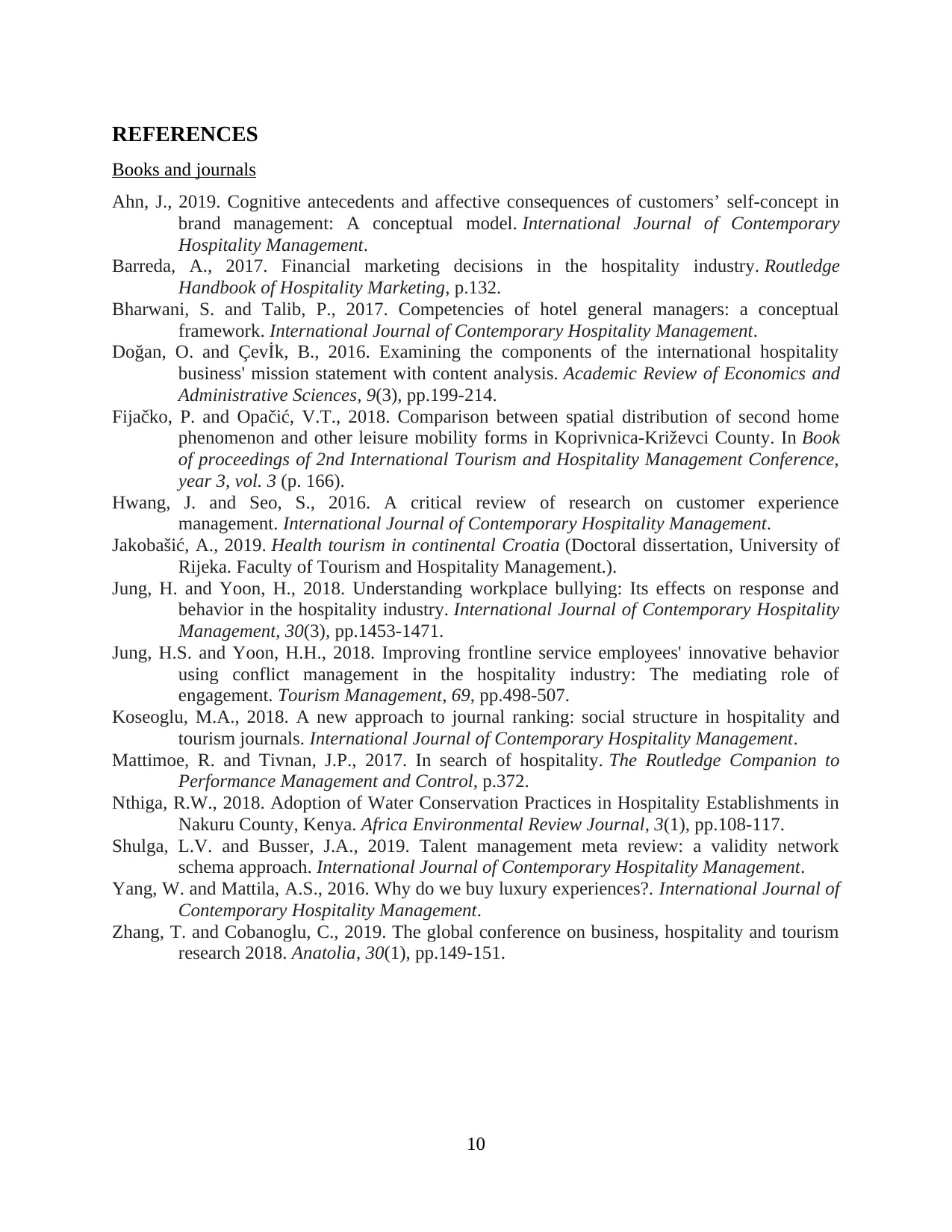
REFERENCES
Books and journals
Ahn, J., 2019. Cognitive antecedents and affective consequences of customers’ self-concept in
brand management: A conceptual model. International Journal of Contemporary
Hospitality Management.
Barreda, A., 2017. Financial marketing decisions in the hospitality industry. Routledge
Handbook of Hospitality Marketing, p.132.
Bharwani, S. and Talib, P., 2017. Competencies of hotel general managers: a conceptual
framework. International Journal of Contemporary Hospitality Management.
Doğan, O. and Çevİk, B., 2016. Examining the components of the international hospitality
business' mission statement with content analysis. Academic Review of Economics and
Administrative Sciences, 9(3), pp.199-214.
Fijačko, P. and Opačić, V.T., 2018. Comparison between spatial distribution of second home
phenomenon and other leisure mobility forms in Koprivnica-Križevci County. In Book
of proceedings of 2nd International Tourism and Hospitality Management Conference,
year 3, vol. 3 (p. 166).
Hwang, J. and Seo, S., 2016. A critical review of research on customer experience
management. International Journal of Contemporary Hospitality Management.
Jakobašić, A., 2019. Health tourism in continental Croatia (Doctoral dissertation, University of
Rijeka. Faculty of Tourism and Hospitality Management.).
Jung, H. and Yoon, H., 2018. Understanding workplace bullying: Its effects on response and
behavior in the hospitality industry. International Journal of Contemporary Hospitality
Management, 30(3), pp.1453-1471.
Jung, H.S. and Yoon, H.H., 2018. Improving frontline service employees' innovative behavior
using conflict management in the hospitality industry: The mediating role of
engagement. Tourism Management, 69, pp.498-507.
Koseoglu, M.A., 2018. A new approach to journal ranking: social structure in hospitality and
tourism journals. International Journal of Contemporary Hospitality Management.
Mattimoe, R. and Tivnan, J.P., 2017. In search of hospitality. The Routledge Companion to
Performance Management and Control, p.372.
Nthiga, R.W., 2018. Adoption of Water Conservation Practices in Hospitality Establishments in
Nakuru County, Kenya. Africa Environmental Review Journal, 3(1), pp.108-117.
Shulga, L.V. and Busser, J.A., 2019. Talent management meta review: a validity network
schema approach. International Journal of Contemporary Hospitality Management.
Yang, W. and Mattila, A.S., 2016. Why do we buy luxury experiences?. International Journal of
Contemporary Hospitality Management.
Zhang, T. and Cobanoglu, C., 2019. The global conference on business, hospitality and tourism
research 2018. Anatolia, 30(1), pp.149-151.
10
Books and journals
Ahn, J., 2019. Cognitive antecedents and affective consequences of customers’ self-concept in
brand management: A conceptual model. International Journal of Contemporary
Hospitality Management.
Barreda, A., 2017. Financial marketing decisions in the hospitality industry. Routledge
Handbook of Hospitality Marketing, p.132.
Bharwani, S. and Talib, P., 2017. Competencies of hotel general managers: a conceptual
framework. International Journal of Contemporary Hospitality Management.
Doğan, O. and Çevİk, B., 2016. Examining the components of the international hospitality
business' mission statement with content analysis. Academic Review of Economics and
Administrative Sciences, 9(3), pp.199-214.
Fijačko, P. and Opačić, V.T., 2018. Comparison between spatial distribution of second home
phenomenon and other leisure mobility forms in Koprivnica-Križevci County. In Book
of proceedings of 2nd International Tourism and Hospitality Management Conference,
year 3, vol. 3 (p. 166).
Hwang, J. and Seo, S., 2016. A critical review of research on customer experience
management. International Journal of Contemporary Hospitality Management.
Jakobašić, A., 2019. Health tourism in continental Croatia (Doctoral dissertation, University of
Rijeka. Faculty of Tourism and Hospitality Management.).
Jung, H. and Yoon, H., 2018. Understanding workplace bullying: Its effects on response and
behavior in the hospitality industry. International Journal of Contemporary Hospitality
Management, 30(3), pp.1453-1471.
Jung, H.S. and Yoon, H.H., 2018. Improving frontline service employees' innovative behavior
using conflict management in the hospitality industry: The mediating role of
engagement. Tourism Management, 69, pp.498-507.
Koseoglu, M.A., 2018. A new approach to journal ranking: social structure in hospitality and
tourism journals. International Journal of Contemporary Hospitality Management.
Mattimoe, R. and Tivnan, J.P., 2017. In search of hospitality. The Routledge Companion to
Performance Management and Control, p.372.
Nthiga, R.W., 2018. Adoption of Water Conservation Practices in Hospitality Establishments in
Nakuru County, Kenya. Africa Environmental Review Journal, 3(1), pp.108-117.
Shulga, L.V. and Busser, J.A., 2019. Talent management meta review: a validity network
schema approach. International Journal of Contemporary Hospitality Management.
Yang, W. and Mattila, A.S., 2016. Why do we buy luxury experiences?. International Journal of
Contemporary Hospitality Management.
Zhang, T. and Cobanoglu, C., 2019. The global conference on business, hospitality and tourism
research 2018. Anatolia, 30(1), pp.149-151.
10
⊘ This is a preview!⊘
Do you want full access?
Subscribe today to unlock all pages.

Trusted by 1+ million students worldwide
1 out of 12
Related Documents
Your All-in-One AI-Powered Toolkit for Academic Success.
+13062052269
info@desklib.com
Available 24*7 on WhatsApp / Email
![[object Object]](/_next/static/media/star-bottom.7253800d.svg)
Unlock your academic potential
Copyright © 2020–2026 A2Z Services. All Rights Reserved. Developed and managed by ZUCOL.



